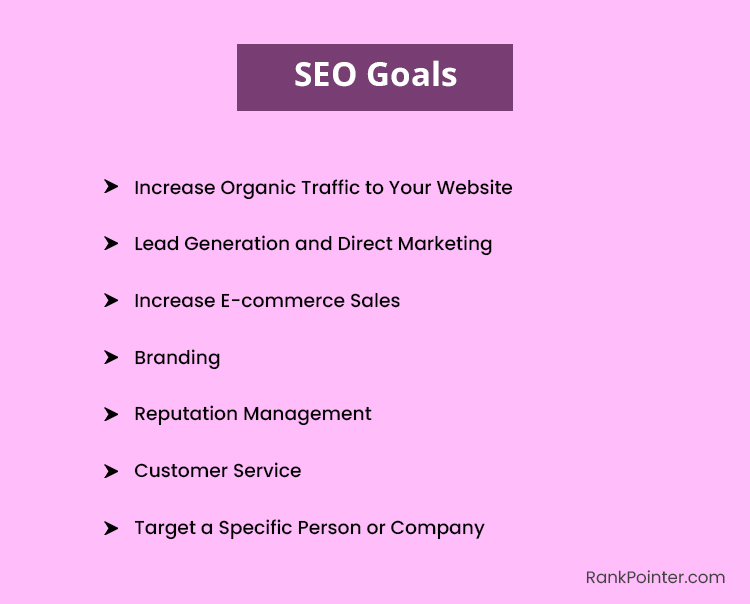Selecting optimal SEO goals for your business website is a crucial initial phase in your digital marketing strategy.
Similar to any long-term pursuit, understanding your marketing objectives upfront and focusing efforts towards them conserves time, resources, and alleviates pressure. This article explores seven distinct SEO goals and their potential impact on your business.
What Are SEO Goals?
SEO goals serve as the guiding principles that direct a business’s SEO strategy. These goals are not only specific but also measurable, allowing businesses to track progress and adjust strategies accordingly.
The purpose of SEO goals is to expand reach, enhance online visibility, and ultimately drive meaningful engagement and conversions through organic search.
Major SEO Goals
Here are the major SEO objectives.
1. Increase Organic Traffic to Your Website
The aim here is to attract as many visitors to the website as possible and keep them engaged. Emphasizing quality content creation, keyword research, and ethical SEO practices is vital.
It’s essential to prioritize value over volume to ensure sustained traffic growth and enhance user experience.
Related Article: 15 SEO Techniques to Boost Your Organic Traffic
2. Lead Generation and Direct Marketing
This objective focuses on nurturing leads and driving revenue through personalized interactions. By optimizing conversion rates and employing A/B testing, businesses can streamline the lead generation process.
Additionally, targeted content creation and effective marketing automation tools play crucial roles in maintaining customer engagement and retention.
3. Increase E-commerce Sales
This objective revolves around driving relevant traffic to the e-commerce platform and optimizing the sales funnel.
Tailoring keyword strategies to match user intent and simplifying the purchasing process through Conversion Rate Optimization (CRO) are key. Effective audience targeting and strategic keyword optimization enhance transactional sales.
4. Branding
Branding efforts aim to enhance customer awareness and foster brand loyalty. Establishing a robust online presence, focusing on targeted keyword optimization, and building quality backlinks are pivotal.
SEO facilitates consumer engagement, reinforces brand identity, and enhances trust, ensuring long-term brand growth and recognition.
5. Reputation Management
This objective involves safeguarding brand reputation by actively managing online presence. Through strategic SEO practices, businesses can curate positive search results, mitigate negative feedback, and build brand credibility.
Prioritizing brand consistency, proactive engagement, and effective crisis management strategies are essential for maintaining a positive brand image.
Read More: Reputation Management in SEO: Guide and Strategies
6. Customer Service
This objective centers on providing timely and comprehensive answers to customer queries and concerns. By leveraging SEO-driven content, businesses can address customer needs proactively, foster positive interactions, and build long-lasting relationships.
Prioritizing customer satisfaction and engagement enhances brand loyalty and drives business growth.
7. Target a Specific Person or Company
This objective involves personalized outreach to specific individuals or organizations. By combining SEO practices with Account Based Marketing (ABM) principles, businesses can tailor marketing efforts to key prospects.
Effective audience segmentation, personalized messaging, and targeted content creation enhance engagement and drive conversions.

Wrapping Up: SEO Objectives
Setting clear SEO goals is fundamental to achieving long-term success in the internet. By aligning SEO efforts with overarching business objectives and continually adapting to evolving trends, businesses can establish a strong online presence and unlock new opportunities for growth and success.


